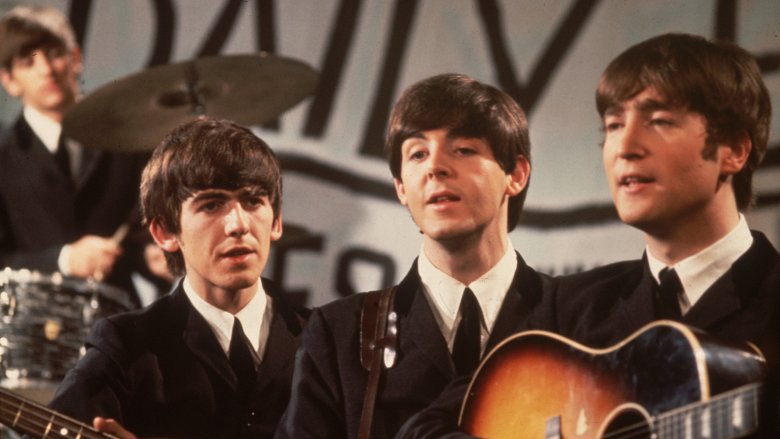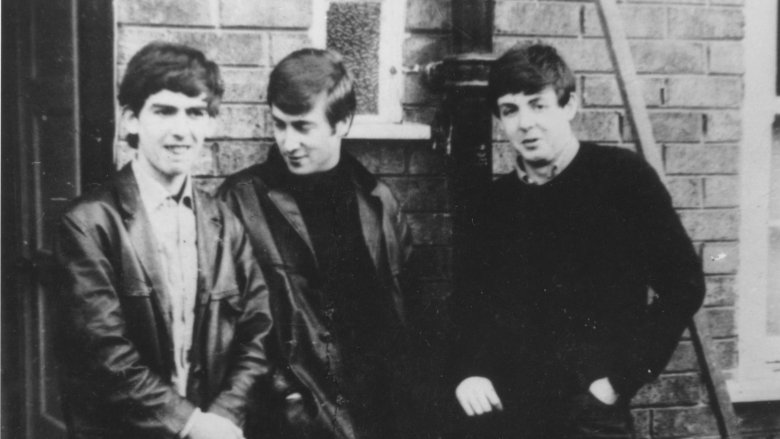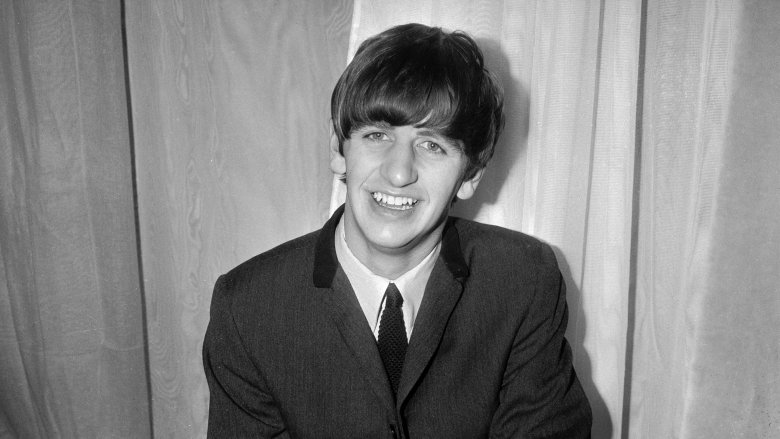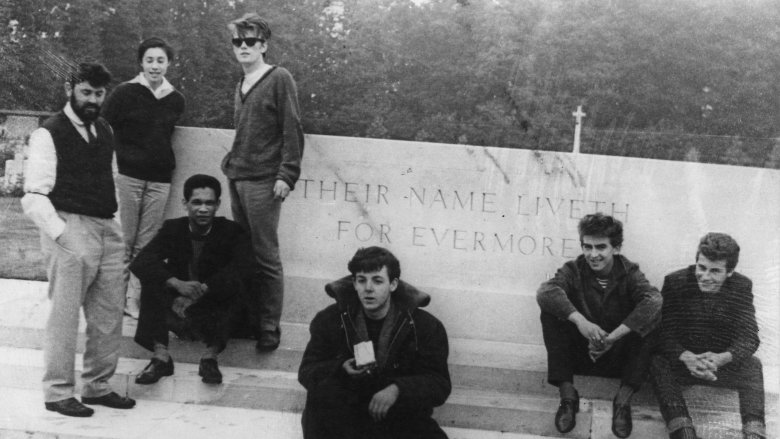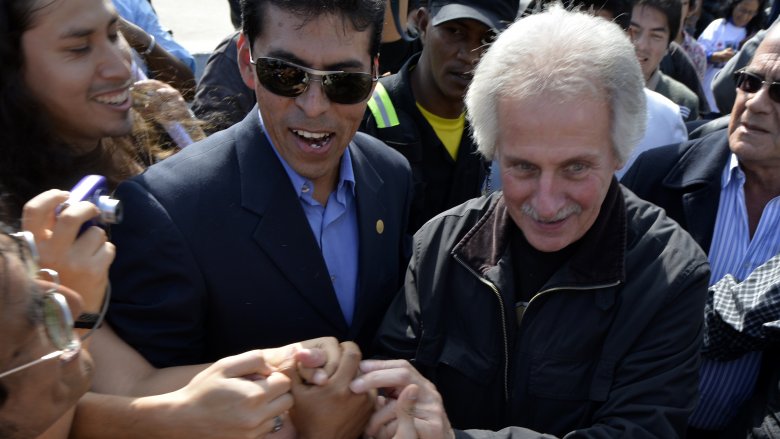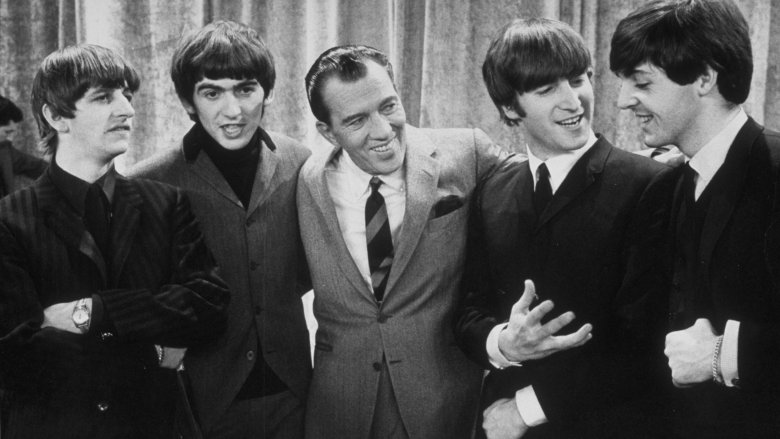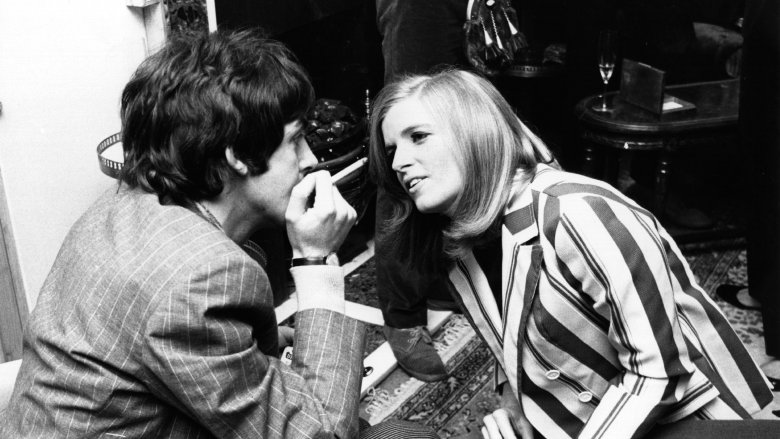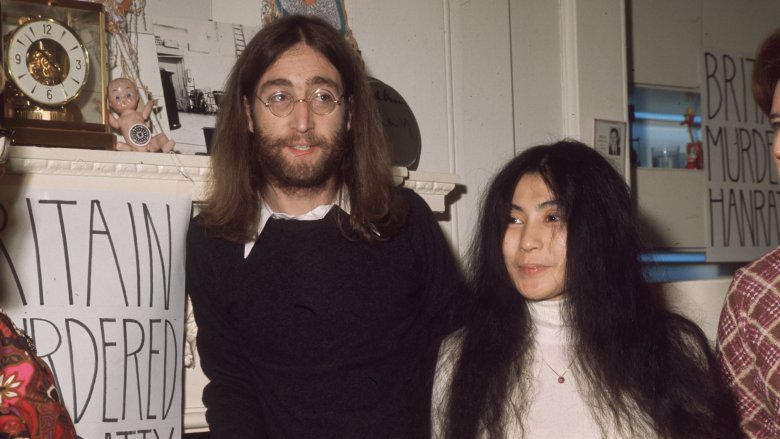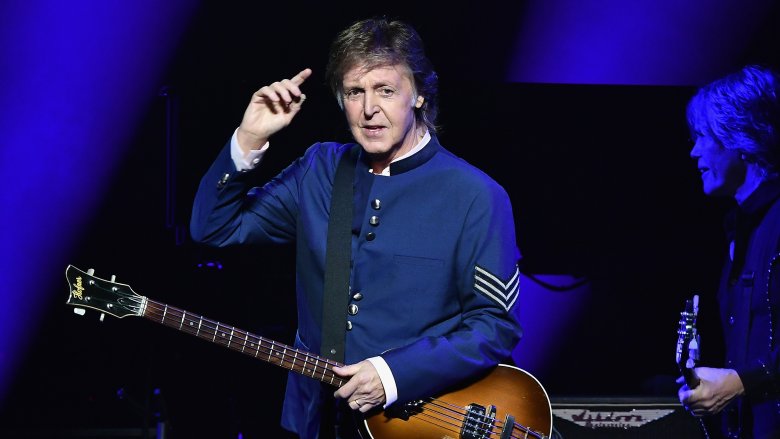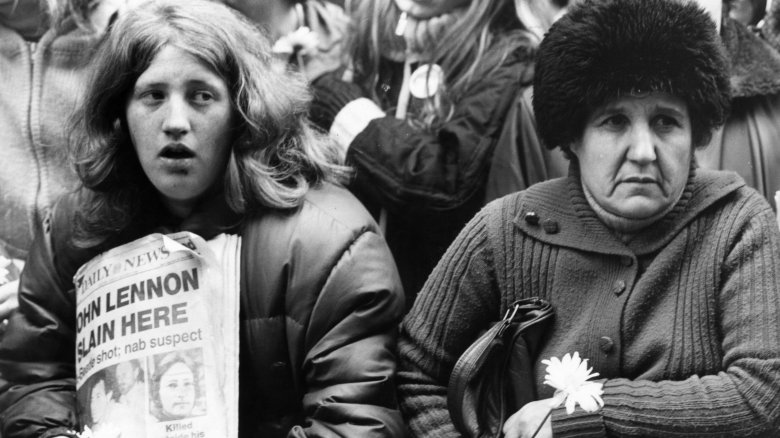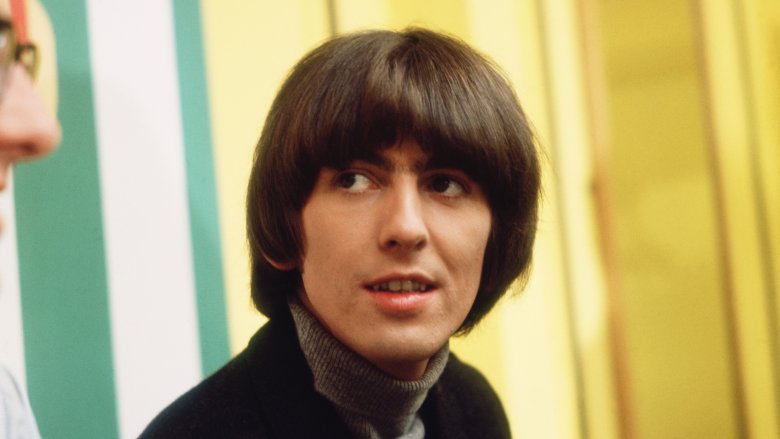The Beatles' Tragic Real-Life Story
The Beatles are probably one of mankind's greatest success stories. Think about it: Four working-class men from the north of England come together to play music and, with a bit of luck, hard work, and savvy, go on to sell hundreds of millions of albums, top the charts and go down as perhaps the most influential band of all time. Frankly, it's entirely likely that no other group or musician will ever be so lauded or recognized as the Fab Four.
While they may have hit heights like no other, however, the truth is that the Beatles' career was fraught with difficulty. They faced troubled upbringings, disastrous early shows, frequent brushes with the law and, after their eventual break-up, the tragic deaths of two of their members. Maybe, though, the fact that the Beatles fought all that and won so spectacularly only serves to make their legacy all the more impressive.
The Lennon family's feud
None of the Beatles had particularly easy beginnings, but special mention must be made for the circumstances under which John Lennon was raised. Born in 1940, Lennon's father, Alfred, was barely present for the early days of John's life. The real conflict came between his mother, Julia, and his Aunt Mimi. These two women — who were vastly different in both temperament and in social status — vied for control of the young John for much of his youth.
Perhaps the most well-known story about John's childhood took place at the age of 5, when his father forced him to choose between him or his mother. John first chose Alfred, but then ran up the street to his mother in tears when she left. Alfred disappeared after that, not to appear again until after the Beatles found fame. These experiences had an effect on Lennon — as a youth, he led gangs, shoplifted, and bullied fellow students and teachers alike. This rebellious streak would famously continue into adulthood.
Starr's Dickensian childhood
While Lennon's childhood was troubled, however, Ringo Starr's was downright nightmarish. Starr, born Richard Starkey, had his father walk out on him when he was four. He also fell victim to a host of diseases throughout his childhood, including appendicitis, peritonitis (which led to a 12-month stint in a children's hospital), and even tuberculosis. That last one meant he was forced to spend two years in a sanatorium.
Luckily, things started to look up from there. His stepfather began to encourage the young boy's interest in music during his time in the sanatorium, and he was given his first drum kit for Christmas in 1957, two years after his release. Only a few years later he joined his first proper band, changed his name to Ringo Starr, and while touring in Germany met a group of talented young musicians on residency in Hamburg who were calling themselves the Beatles. The rest is history.
Their disastrous first residency
In the very early days of the 1960s, the Beatles — who were, at the time, practically unknown — scored a gig playing a residency slot at the Indra Club in Hamburg. They'd managed to land this opportunity through Allan Williams, a Liverpool club owner and the Beatles' manager at the time. He had used his strong relationship with Bruno Koschmider, owner of the Indra Club, to secure the Beatles their slot.
It went badly. The Beatles then consisted of Paul McCartney, John Lennon, George Harrison, Pete Best, and Stuart Sutcliffe. They slept on bunk beds in a theater storeroom and made £2.50 for four shows every weeknight, five on Saturdays and six on Sundays. On top of this, they were using the stimulant Preludin to keep themselves going. Things came crashing down for good, though, when the band took a better opportunity offered to them by the owner of a rival club. An incensed Koschmider got his revenge by reporting Harrison (who was underage and ineligible to work) to the German police. He was deported shortly afterward. And then Koschmider had McCartney and Best arrested and deported for setting fire to a condom. All things considered, not a great sequence.
The lost Beatles
It was in Hamburg that the band's bassist, Stuart Sutcliffe, met a photographer named Astrid Kirchherr. Within two months, they were engaged to be married. Sutcliffe wouldn't be a Beatle for much longer, though — he left the group in 1961 to live with Astrid and focus on his career as a painter. In 1962, he died of a cerebral hemorrhage at the age of 21.
Pete Best's time with the band soon came to an end, too. The same year Sutcliffe died, the band managed to land a recording contract with EMI and met one of their executives, George Martin, to discuss their future as a group. Best was subsequently forced out of the band. He faced a bout of depression afterward, even attempting to take his own life a few years later. Luckily, he recovered thanks to the efforts of his mother and brother. He and the rest of the Beatles barely spoke after the firing, and Best still plays in his own band to this day.
Struggles in America
The Beatles are renowned for leading the so-called "British Invasion" of America, firmly establishing themselves as one of the country's most successful groups from overseas. That success, however, didn't come easy. At first, the band couldn't even land a contract with their own label's American counterpart. When their music was finally issued in America, they saw very little circulation and their first imprint in America even spelled the band's name incorrectly: "Beattles."
The Beatles finally received some news coverage thanks to a morning segment on CBS — which aired on November 22, 1963, now better remembered as the day JFK was shot. "Please Please Me," "From Me to You," and "She Loves You" were all flops, with some listeners phoning in to radio stations to try to get them to stop playing the band's music. It wasn't until their legendary debut on The Ed Sullivan Show in 1964 that the Beatles broke America for good.
Fighting the law
When you compare them to some of the raucous rockers who came just after them (Rolling Stones, anyone?) it can be easy to think of the Beatles as the do-gooders of '60s pop music. And, to an extent, that's actually true — most of their brushes with the law came thanks to their love of soft drugs. Still, that doesn't mean their record was entirely unblemished during their heyday.
We've already seen how McCartney and Best were deported from Germany for burning things. The homes of various Beatles were also frequently raided by the police thanks to the efforts of a draconian police sergeant named Norman Pilcher, who was head of a British drug enforcement group. It was the Swedish police, however, who would finally nab a Beatle for possession: Paul and his wife, Linda, were charged $2,000 as a fine for holding marijuana in 1972. Those two would be brought in on the same quite a few times over the next few years, including by police in Japan and Barbados.
The slow death of the Beatles
Tensions had already begun to rise among the Beatles after John Lennon took the unprecedented move of allowing an outsider, Yoko Ono, into the band's recording sessions. The relationship between the two lovers and the rest of the group only deteriorated further when Ono and Lennon began using heroin.
Meanwhile, McCartney's domineering attitude had, according to Rolling Stone, become "noxious and condescending" to the other members of the band. Harrison begun to feel sidelined by McCartney and Lennon, a matter made all the worse as Ono's effect on the group became more pronounced. Eventually, Harrison could take no more. He quit the band on January 10, 1969. A begrudging reconciliation was eventually found between Harrison, Lennon, and Yoko, but things remained tense. The Beatles played their last live show on the rooftop of their label's offices in London on January 29.
At the end of 1969 — after a series of battles and feuds over the band's finances — Lennon quit the band. McCartney left as the decade turned and, by 1971, the Beatles came to a final end.
The post-Beatles world
The end of the Beatles was devastating for each of its members, not least McCartney. In an interview with BBC Radio 4, he recalled that he became depressed after the split, claiming it was akin to being "in the army where you'd been army buddies for a few years, and now you weren't going to see them again." He took to drinking to cope and only came out of it once his wife, Linda, convinced him to start a new project.
Harrison and Starr both embarked on solo careers, but none ever quite reached the heights they'd found with the Beatles. Tensions remained high between certain members of the group for some time after the split, too, as summed up beautifully in a catty letter sent from Lennon to the McCartneys. In it Lennon criticized the Beatles and extolled the successes Lennon and Ono had enjoyed since leaving the band. "By the way — we've had more intelligent interest in our new activities in one year than we had throughout the Beatle era." Yikes.
A murder on the streets of New York
On the night of December 8, 1980, John Lennon and Yoko Ono ate out for dinner near their apartment in New York. Afterward, they returned home to say goodnight to their son Sean. They stepped out onto the street, where a man named Mark Chapman was waiting for them with a .38 handgun. He shot Lennon four times in the back. By the time the police arrived, it was too late; despite the efforts of a team of doctors and nurses, he died just before midnight at a local hospital.
Lennon's assassination shocked the world. Although Ono declined to hold a funeral for him, a wave of mourning took the world. Tens of thousands gathered in Liverpool and New York to commemorate the late Beatle with a 10-minute silence, through which even the New York radio stations went off the air. The violent death cemented John Lennon's status as an icon and a martyr.
The death of George Harrison
In 1997, George Harrison was diagnosed with throat cancer, an illness most likely caused by his many years of smoking. In 2001 he was treated for a brain tumor in Switzerland, and later that year began radiotherapy treatment in New York for the lung cancer that had spread to his brain. According to his close friend Michael Palin, "death held no terrors for George," thanks in part to his spirituality.
On November 29, 2001, George Harrison died at the age of 58 in Los Angeles. He was remembered by McCartney as "my baby brother." Ringo Starr, whose daughter was then undergoing similar treatment for a brain tumor, also visited Harrison in hospital shortly before his death. With the passing of Harrison, two Beatles now remain: Ringo Starr, who released his latest album in September 2017, and Sir Paul McCartney, who remains one of music's most prolific solo artists.
